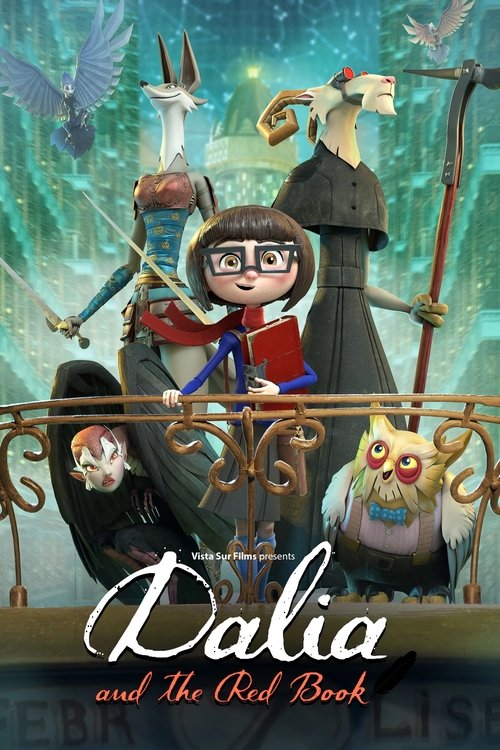Dalia and the Red Book

Plot
Dalia and the Red Book is a thought-provoking and imaginative tale that delves into the realms of literary fiction, weaving a narrative that not only honors the art of storytelling but also scrutinizes the human condition. The story centers around Dalia, the daughter of the enigmatic and celebrated author, Leon Dubois, who has recently passed away, leaving behind an unfinished manuscript and an insatiable curiosity within his loved ones. As Dalia sorts through her father's numerous belongings, she becomes engrossed in the sprawling, unfinished novel – 'The Book of Lost Voices' – which features an unapologetic character named Rúben, in tandem with his female companion who possesses a dark, fiery spirit. Being an intriguing novel, it not only evokes Dalia's empathy but also compels her to carry the torch for her father. Overwhelmed with the intensity of her feelings towards her deceased father, an eclectic magic interwoven within the novel elevates the literary work into life. When Dalia returns to her father's old study to collect his fragmented ideas and scribbled manuscripts, she eventually unlocks an otherworldly narrative that propels its readers into an enigmatic domain. Unbeknownst to Dalia, she becomes an integral part of the novel, merging with the crimson book, allowing her to not only experience the very presence of her father's narrative but also giving her an advantage to explore and change the narrative itself. Gradually, characters step out of their fictional realm as Dalia interacts and crafts the story alongside them, drawing energy and vigor from Rúben. A certain magnetism and creative force between Dalia and the character from the novel signify the rising recognition of how easily a story becomes a reality and vice versa. An unfolding narrative binds Dalia and her companions, eventually enveloping them in complex dynamics and diverse symbolism of human emotions. León's words are like intricate connections; they weave an entire symbolic narrative full of diverse symbols and meanings. Dalia's emergence into the fictional realm appears unexpected, despite the characters recognizing her potential as a harmonious counterpart to their fictional existence. All these elements blend to present an enthralling mystery of narratives created within a story. In a world between story and reality, Dalia, working hand-in-hand with the other characters, brings forth vital yet profound lessons about humanity. Beguiled by the magical allure of the red book, she finds herself immersed in unfamiliar landscapes and delves into various circumstances, ultimately plunging into the collective complexities of human existence that resonated deeply with her deceased father. As the chapters progress, Dalia's empathy unifies everyone around her; however, such connections produce another internal query that troubles Dalia and results in more of emotions coming into life. Thus, her journey transcends mere reading; the intricate links forged amidst characters within the fictional story reveal that, much like a canvas painting formed by layers of colors and contrasting shades, Dalia brings a new layer, one rich in feelings and rich in emotional depths. In her adventure across various fictional worlds, Dalia discovers and gets an increased awareness of who she was and what she became – a brave adventurer and also someone capable of overcoming and recognizing one's personal identity. Thus, beneath the artistic elements of its symbolic narrative, the story conveys strong messages on love, self-discovery, and the symbolic realization that, every time we decide to let a story have its way through us as a material component, it redefines and changes us in terms of its subjective intermingling of reality.
Reviews
Brielle
Alright, I'll translate "笨蛋小屁孩" in a way that fits the context of potentially reviewing a film like "Dalia and the Red Book," keeping in mind varying tones: **Option 1 (General/Neutral):** "Silly kid." **Option 2 (Slightly More Affectionate/Comic):** "Goofy kid." **Option 3 (More Negative/Critical):** "Stupid brat." Or, "Little idiot." **Option 4 (If the context suggests mischief):** "Rascal." Or, "Little troublemaker." Which translation is most suitable depends on the specifics of when and how this phrase is used in your review.
Adriana
Falling into one's own novel is realized in this film with more genuine emotion than in "A Writer's Odyssey." It perfectly interweaves the process of creating a story – crafting details, laying groundwork, piecing together inspiration – with the "refined language" and "last-second rescues" of the narrative itself. The film seamlessly packages these writing challenges within an adventurous experience, making it almost educational for children. While the animation and the richness of the story world characters may be lacking, these flaws are outweighed by its merits.
Scarlett
"Dalia and the Red Book" marks my first foray into Argentinian animation, and it was quite a delightful experience. The film's core revolves around the profound theme of family, particularly the heartwarming bond between Dalia and her father. His artistic talent, manifested through the creation of relatable and lifelike characters with his paintbrush, serves as a catalyst, inspiring Dalia to craft her own enchanting fairytale using her boundless imagination. While the portrayal of familial love in animation can often feel somewhat formulaic, truly capturing its essence is a challenging feat. This film, however, does a commendable job in its depiction. The narrative vividly paints Dalia's encounters and experiences within the fantastical world of her tale, introducing us to memorable figures like the formidable Lady Wolf, the steadfast Goat Guardian, and the wise Owl Librarian.
Sylvia
A novelist's imagination must be boundless. The characters are unlikeable, even a bit sinister.
Arya
Not bad?
Recommendations




